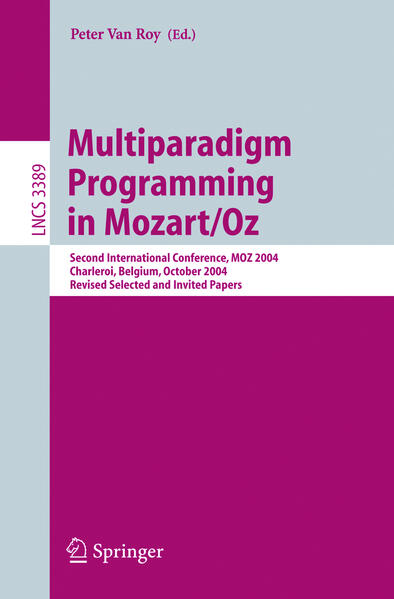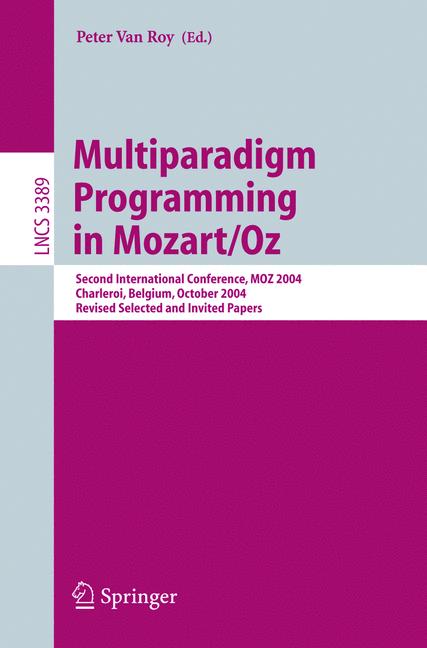To many readers, Mozart/Oz represents a new addition to the pantheon of p- gramming systems. One way of evaluating a newcomer is through the eyes of the classics, for example Kernighan and Pike s The Practice of Programming, a bookthatconcludeswithsix lastingconcepts :simplicityandclarity, generality, evolution, interfaces, automation, andnotation. KernighanandPikeconcentrate on using standard languages such as C and Java to implement these concepts, but it is instructive to see how a multiparadigm language such as Oz changes the outlook. Oz s concurrency model yields simplicity and clarity (because Oz makes it easier to express complex programs with many interacting components), g- erality, and better interfaces (because the data? ow model automatically makes interfaces more lightweight). Constraint programming in Oz again yields simplicity and clarity (because theprogrammercanexpresswhatneedstobetrueratherthanthemorecomplex issue of how to make it true), and o? ers a powerful mathematical notation that is di? cult to implement on top of languages that do not support it natively. Mozart s distributed computing model makes for improved interfaces and eases the evolution of systems. In my own work, one of the most important concernsistobeabletoquicklyscaleupaprototypeimplementationintoalar- scale service that can run reliably on thousands of computers, serving millions of users. The ? eld of computer science needs more research to discover the best ways of facilitating this, but Mozart provides one powerful approach. Altogether, Mozart/Ozhelpswithallthelastingconceptsexceptautomation, and it plays a particularly strong role in notation, which Kernighan and Pike pointoutisanunderappreciatedarea. Ibelievethatprovidingtherightnotation isthemostimportantofthesixconcepts, onethatsupportsalltheothers. Mul- paradigm systems such as Oz provide more choices for notation than sing- paradigm languages.
Inhaltsverzeichnis
Keynote Talk. - The Development of Oz and Mozart. - Security. - The Structure of Authority: Why Security Is Not a Separable Concern. - The Oz-E Project: Design Guidelines for a Secure Multiparadigm Programming Language. - Computer Science Education. - A Program Verification System Based on Oz. - Higher Order Programming for Unordered Minds. - Software Engineering. - Compiling Formal Specifications to Oz Programs. - Deriving Acceptance Tests from Goal Requirements. - Human-Computer Interfaces and the Web. - Using Mozart for Visualizing Agent-Based Simulations. - Web Technologies for Mozart Applications. - Overcoming the Multiplicity of Languages and Technologies for Web-Based Development Using a Multi-paradigm Approach. - Distributed Programming. - P2PS: Peer-to-Peer Development Platform for Mozart. - Thread-Based Mobility in Oz. - A Fault Tolerant Abstraction for Transparent Distributed Programming. - Grammars and Natural Language. - The CURRENT Platform: Building Conversational Agents in Oz. - The Metagrammar Compiler: An NLP Application with a Multi-paradigm Architecture. - The XDG Grammar Development Kit. - Constraint Research. - Solving CSP Including a Universal Quantification. - Compositional Abstractions for Search Factories. - Implementing Semiring-Based Constraints Using Mozart. - A Mozart Implementation of CP(BioNet). - Constraint Applications. - Playing the Minesweeper with Constraints. - Using Constraint Programming for Reconfiguration of Electrical Power Distribution Networks. - Strasheela: Design and Usage of a Music Composition Environment Based on the Oz Programming Model. - Solving the Aircraft Sequencing Problem Using Concurrent Constraint Programming. - The Problem of Assigning Evaluators to the Articles Submitted in an Academic Event: A Practical Solution Incorporating Constraint Programming and Heuristics. - An Interactive Tool for the Controlled Execution of an Automated Timetabling Constraint Engine.











